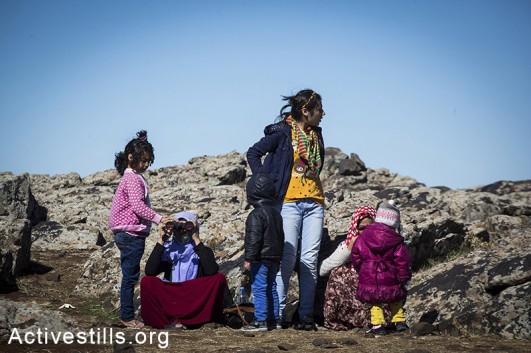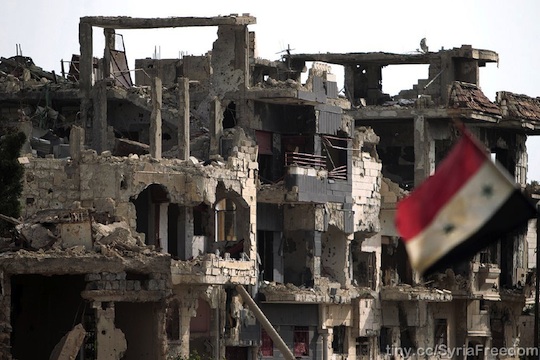The Syria that was once an icon of enlightenment and education has been erased, crushed under barrel bombs and proxy power struggles, as the world watches and waits to see how it will all end. What, after all, have we learned from history?
Run, run away all you strong and invulnerable Israelis, and all you Palestinian freedom fighters pursuing liberation from the occupation, Jewish and Arab human rights activists, seekers of peace and fellowship between peoples. Let’s all run away from Aleppo, Idlib, Palmyra, Raqqa, Homs and all the Syrian cities that have been destroyed.
Who needs to see more horrors, bloodshed, mass executions and shelling of pale, thin people wrapped in winter blankets while fleeing for their lives? Let’s wait for the pictures of bodies dragged by bulldozers into mass graves; let’s wait for the pictures of piles of shoes — this time in color, and high-quality — and whisper quietly to one another about what they remind us of.
Arab leaders who are anxious over their rule, Arab nations who are the champions of silence and prayer; thousands pray and yearn for a malignant disease and horrible death to take Bashar al-Assad away from this world and free the Syrian people from a merciless dictator. In other mosques, people pray for members of the Islamic State to be wiped out and thank their new god, Putin, for the victory of Assad the “lion.”
Let’s wait for a drone with a camera and satellite photos, and share pictures of immense destruction in emotional Facebook posts. Let’s count ‘likes’ and silly yellow faces while our fellow human beings, a few hours away from us, are counting bodies and children whose lives have been lost. Let’s keep warm in our heated homes and curse Russia, Turkey, Iran and the U.S., Israel and the UN, and let’s hone the curses that will supposedly defeat the military powers. Facebook statuses will down their jets and stop Russia’s bombs, which have been falling on Aleppo continually for the last few weeks.
Half a million people have been killed, millions have become refugees in Jordan, Turkey, Europe and Canada, while here in Israel, the Jews are celebrating the arrival of the F35 fighter jet and Israel’s ever longer arm. Where is this arm meant to reach? Iran? Iraq? Where exactly? Perhaps into the pocket of every citizen here. And we, Arabs and Jews who are members of the human race, ache over our short arm, which will not reach a single hungry refugee from Syria. Our impotence is appalling; we have not even managed to cry out in protest.

What we didn’t learn from the Holocaust
When I learned about the Holocaust, I remember constantly asking how it happened, how people could keep silent and how it was that the war wasn’t stopped. With the Nakba, I asked how it could be that Arab countries didn’t lift a finger and why they were so indifferent. My teachers and parents always gave me the same response: that there was no media back then, the world didn’t really know what was happening in real time. They didn’t hear the news, and it took months before the truth was known. “The Arabs were all simple folk back then. We didn’t understand the bigger picture and the right hand didn’t know what the left hand was doing,” my grandma explained.
I thought that was it, and that today, in the age of accessible media and online news, when even small villages are connected to the internet, the truth could not be concealed. We know what is happening everywhere, while it’s happening. So why aren’t we doing anything?
Israel sent aid following the earthquake in Nepal and the tsunami in Thailand. It bounces all over the world, and during the recent wave of fires in Israel, countries around the globe rushed to help. So why is nothing done about a brutal war, like the one in Syria? Why aren’t forces from 28 countries being marshaled to go and fight a single dictator, like in the Gulf War? Does Syria not have enough oil?
Theory of relativity
In my opinion, the Syrian people’s revolt against a brutal regime that ruled for 40 years has been exploited by every country with its own interests. They waited either to fight one another or to strengthen their ties, and have found an outlet on Syrian land: Turkey against the Kurds, Russia against the U.S., Shi’ite Iran against the Sunni rebels, the Iraqi army against IS in Mosul, IS against humanity. The waste from these power struggles has leached into the playground of total war in Syria. And the world stands and watches, to see how all this will end.
Five years ago, this savage regime which abused its citizens supplied the world with brutal images whose goal was to uproot the revolution, images that aroused worldwide sympathy, as well as hope among Arab youth that perhaps, finally, a new era was beginning in the free Arab world. We thought that struggle and protest, as tough as it would be, would see justice done. No one imagined the loss of control that would put the people of Syria through the meat grinder.

By turning its back on the rebels who started this process, the world pushed them aside and allowed evil forces in through the back door, small and extreme armies united around one thing: a law which says that everything is permissible, that in the name of God, anything is possible. No rules, no mercy, and no God who will deny your actions. Killing, raping, shooting, kidnapping, intimidation, a war of the mind and a conquering of global consciousness: it all overcame us, silencing us even before the real fighting began. Photos of executions were shared among the youth of Saudi Arabia, Sudan, Algeria, Morocco, Iraq and even here; ideologically lost, they went to fight with IS and their like, in search of limitless power and in the name of God. These groups — Ahrar al-Sham, Jabhat al-Nusra, IS — all fought one another, uniting and then splintering, with the victor supposedly going on to fight the Assad regime.
Ladies and gentlemen, the theory of relativity. It’s the military technique of the century. You want to fight, train, or invade another country? No problem, we’ll invent and supply some terrorists and armed gangs, and then the official army will get permission to wage war on the unofficial army. The more brutal combatants are towards civilians, the easier it is to define them as terrorists, which in turn legitimizes the army fighting against them, using almost the same methods but with global backing. Thus Assad’s barrel bombs, which have been dropped on refugee camps and killed hundreds of innocents, initially caused horror and outrage before becoming valid weapons, because there is a “cell” or group of fighters of some sort in the camp.
Yarmouk collapsed, as did Daraa; Palmyra fell into the hands of IS and we wept over the wondrous history that had been erased. Assad’s government retook it with Russian and Iranian forces, before IS captured it once more. Photos of refugees in the middle of the ocean, a human river flowing to the heart of Europe, gave the world an opportunity to help from afar, without entering the inferno. But the millions who escaped the fire became a burden to the world, despite this chapter of human history having only just begun.

Syria my love
Dear Syria, once an icon of an enlightened Arab country; beautiful and educated; etched into my mind as a country of resistance which did not give in to Israel; an Arab country which taught the Gulf states that money doesn’t advance culture, art or history; a country which didn’t give up on the dream of Palestine.
Today, this Syria is burned and destroyed. And its people, which for 70 years embraced Palestinian refugees, has itself become human fuel for the war machine.
Childhood poems from Syria are echoing in my mind today, and suddenly the words are so painful and true:
Syria my love
You returned to me my dignity
You returned to me my identity
In war and in battle the torch of wounds
Lit up for me the path to revolution
Heralding to the world the returning dawn
My love, my love.
This post was originally published in Hebrew on Local Call. Read it here. Translated by Natasha Roth.



